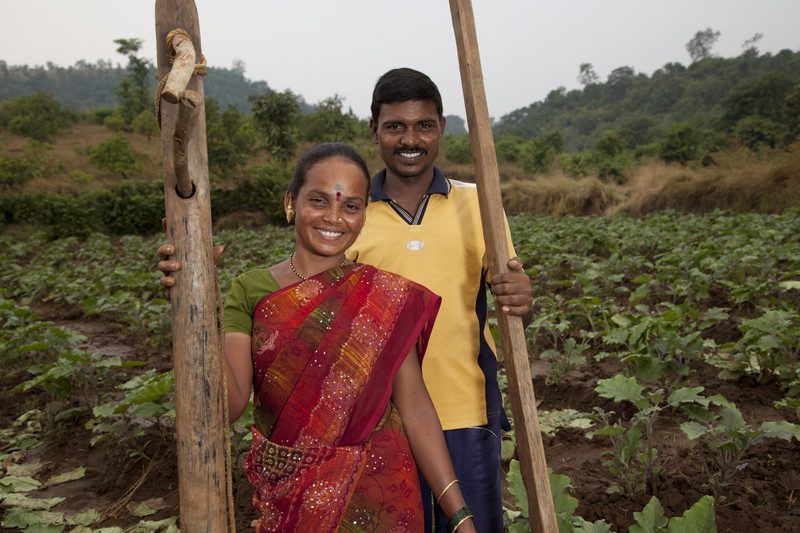
Surrounded by picturesque hills and forests, the tiny hamlet of Bardawadi is located in the Indian state of Maharashtra. It’s home to small, often marginalised indigenous groups such as the Thakar and the Katkari, who eke out a living working the land.
Thakar couple Yashwant (35) and Hira (30) used to work as labourers on a farm owned by an elderly couple. The work was tough, their employer abusive and the pay paltry – on an average day they’d make Rs. 30–40 (AUD $0.65–0.85) each. On that income, they couldn’t afford much in the way of food, so their meals tended to revolve around nachni (finger millet), rotis or rice with chillies and chutney. Not exactly the healthiest or most varied diet.
But Yashwant and Hira are no ordinary couple. In a society where women usually live and work in their husbands’ shadow, Hira and Yashwant share a relationship built on mutual respect and camaraderie. About five years ago, they decided to try vegetable farming on their small plot of land in an effort to improve their situation. Says Yashwant: “We decided that we should not be working on another’s farm – why don’t we work on our own land?”
The risk paid off. In their first year of home farming, Hira and Yashwant made a profit of Rs. 35,000 on a crop consisting mainly of brinjal (eggplant) and tomatoes. Encouraged by their success, they approached local organisation SAKAV (a partner of Oxfam India) for support. “SAKAV said if you are ready to work and contribute … then we will invest in you and your vegetable crop.”
SAKAV’s investment included water pumps, pipes, oil, machine parts, seeds and agricultural training. Yashwant and Hira took a lease on two acres of land so they could grow more crops. As their output increased, so too did their earnings and quality of life. Hira explains: “Now because we have sufficient income, we are able to buy masala, we are able to buy pure oil, we are able to eat vegetables. So now there is no… dirty food for us. We are eating sufficient food.”
Land ownership can be difficult for poor tribal families to secure, but with SAKAV’s help, Hira and Yashwant were also able to acquire five gunthas of land (about 0.05ha). Unusually for a culture where the husband is generally the sole land-owner, they hold joint title of the property. Remembering what their life used to be like, the couple can’t believe how things have changed.
These days, instead of simply scraping by from one day to the next, they enjoy economic security. Not only do they own their land and have enough to eat, but they’re looking forward to a bright future: “Our main aim is to buy more land, save more money in the bank, and live a comfortable life.”
By donating to Oxfam’s Harvest Appeal you’ll be helping other families like Hira and Yashwant harvest a brighter future. Find out more about our work in India.